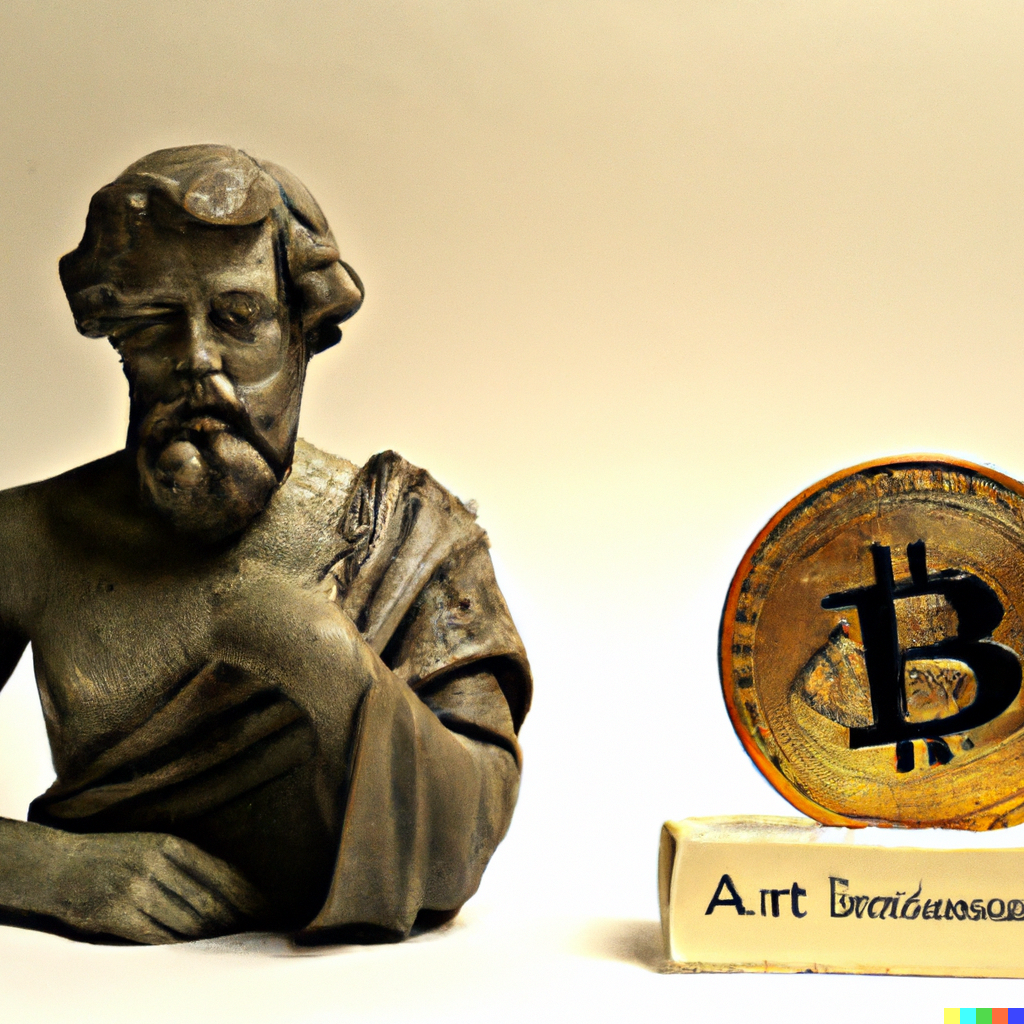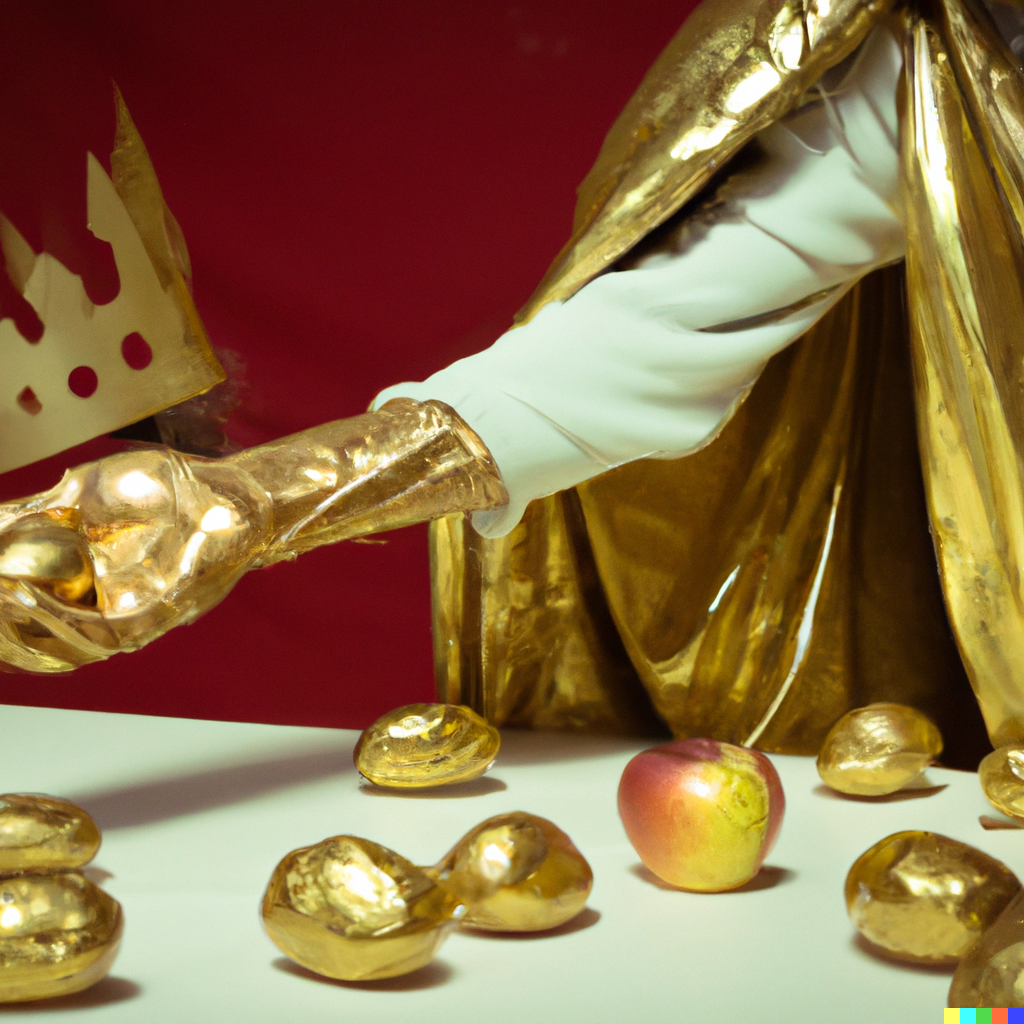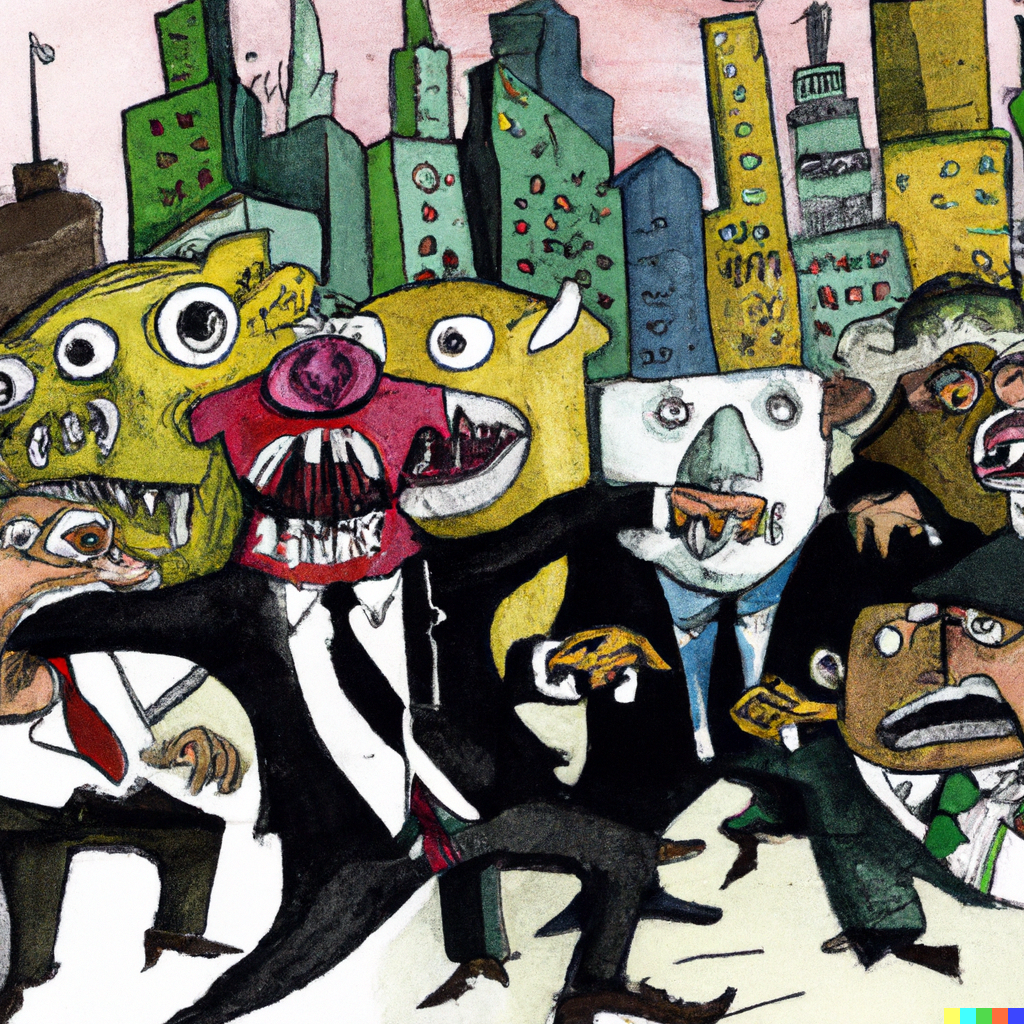
Bitcoin And The Ancients: Aristotle and the Natural Limits of Money
Block 77777 · Nostr · Twitter · Support me · 
“For man, when perfected, is the best of animals, but, when separated from law and justice, he is the worst of all; since armed injustice is the more dangerous, and he is equipped at birth with the arms of intelligence and with moral qualities which he may use for the worst ends. Wherefore, if he has not virtue, he is the most unholy and the most savage of animals, and the most full of lust and gluttony. But justice is the bond of men in states, and the administration of justice, which is the determination of what is just is the principle of order in political society.” - Aristotle
Throughout this series of writings, I will to attempt to ask the question, what do the ancients have to say about Bitcoin?
How does Bitcoin, a new form of digital money address the imbalances within the modern monetary system,returning money to its natural state. The topics of focus are the rulers of money, specifically who is meant to rule money, and how do those who rule,live in accordance with those who are ruled. Secondly, we will draw connections between what Aristotle describes as natural limits of money and how Bitcoin was designed to implement and enforce these limits and how these limits affect the political life of man and ultimately those who are subjected to it. Lastly, in connection with the limits of money we will discuss the creation of fiat money in the modern world and how the principles of fiat money are diametrically opposed to what Aristotle describes as the just creation of money.
In Aristotle’s Politics he attempts to confront the question of what role money play’s within the arena of human affairs. Not the acquisition of money, but the understanding of the instrumentation of money. Aristotle claimed politics is a body of humanity and this body - as he claims – is fundamental to civilization’s existence. He states a hand does not work without the body and therefore an individual does not exist without the political body. Through this frame, Aristotle lays out the ontological hierarchy of man as political animal. The individual is the first level of this hierarchy and cannot exist without the structure of a family. The family unit is the second layer of the hierarchy, and the political level is the third. Following this schema, he attempts to elucidate the necessities of political functions within all three levels; the individual, the family and the political.
Enough has been said about Aristotle’s political structures. Now let’s move on to what Aristotle deems as the natural state of money and how the corruption of money-making has created imbalance within the political realm leading to corruption of the state, family and ultimately the individual.
Part 1: The Rulers and the Ruled
“Seeing then that the state is made up of households, before speaking of the state, we must speak of the management of the household.” – Aristotle’s Politics
Aristotle begins his discussion by dividing the household into its functions he states there are two main functions of the household; The functions of human relations between those who live in the household, the wife and husband, the son and father etc. Aristotle says that the relations between the members of the household is of the upmost importance in the life of the political animal, but he says there is another function of the house-hold what he calls the art of money-making. Specifically, he states
“Property is a part of the household, and therefore the art of acquiring property is a part of the art of managing the household; for no man can live well, or indeed live at all, unless he be provided with necessaries”
Therefore, at its most basic function the family uses “instruments” to acquire its basic necessities. How families acquire their necessities are diverse they can be farmers, craftsmen or traders and within these “arts” they use specific tools; the plough and the ox for farming, the leathers and hammers for craftsmen, the abacus and scale for traders. These tools operate within specific domains and Aristotle states the basic instrument within the acquisition of property is that of money. Therefore, Aristotle believes money plays an important role in the central dynamics of the family and by necessity of the political structures fractal nature, plays an even more important role within the political realm.
Throughout Aristotle’s works he also makes a distinction between the ruled and the rulers and this distinction is inherent within the metaphysical substrate of nature. Some are ruled and others will rule and this relationship only remains harmonious or in accordance with natural law when these relationships are beneficial to both the ruled and the ruler. The practice of obedience and the appropriate use of authority are the virtues of the ruler and the ruled respectively. Aristotle analogically relates this relationship of the ruler and ruled, to body and soul. For the soul must rule the body and not vice-versa, as the opposite in which the body rules the soul is that of a state of corruption and is the nature of animals, not man. However, Aristotle also states the authority given to the master must not be abused, for the abuse of power is not beneficial to one and injurious to the other, in fact the abuse of power is injurious to both as the abuse of the body is injurious to the soul. He states
“The abuse of this authority is injurious to both; for the body and soul, are the same, and the slave is a part of the master, a living but separated part of his bodily frame”
This details one of the most important aspects of Aristotelean philosophy. That ruled and ruler, body and soul are not separated things, but are fundamentally one.
If in our society money is equal to power, Aristotle believes power to be associated with virtue. Now if money is virtue-less, then what is the state of power within that society? When the power is projected within society and it is in the spirit of virtue and justice then Aristotle states that the powerful and the weak have common interests, however when the powerful rely merely on “law and force” this relation puts the body and soul of humanity at odds. Reflect briefly on current state of affairs, the modern rulers of money, the economists openly claim that the current monetary regime as Paul Krugman states is backed by “men with guns.”
As we can see Aristotle would have some choice words for the rulers of our current economic life.
Now, how does Bitcoin alleviate this abusive relationship the world has found itself in. Bitcoin returns us back to a relationship of virtue and justice the Greeks were so fond of and for good reason. Bitcoin maintains control of this money supply not through the use of blood and steel rather Bitcoin keeps order through energy, a decentralized ledger built on code. Creating an immutable, un-censorable, verifiable law that no state, nor man can dictate. The user of Bitcoin volunteers through their own volition to participate within the network, there is no gun to the head of the Bitcoin user, as there was to the many millions who have been subjected to the economic apartheid created by central banks to maintain control of the supply of money. Now ask yourselves what is more just? A military industrial complex used to maim, rape and destroy entire nations or a voluntary open-source software designed for transparency, inclusivity and meritocracy?
Part 2: The Limits of Wealth
In order to understand the limits of money, we must explore the reason for the acquisition of possessions. The acquisition of possessions in Aristotle’s view is an art that is of two kinds. The first kind is the acquisition of property and possessions as a part of household management which he describes as the acquisition of necessities. This he declares as a natural function, and with all natural functions Aristotle declares that the idea of necessities inherently contains a limit in the amount of possessions necessary to maintain basic life. This form of acquisition is that which existed from time immemorial, where barter was the acquisition of basic goods. A family may need 3 cows, 4 chickens and a wheat field in which to survive. Thus nature defines these limits as ones stomach can only be so full. These necessities are what he attributes as true wealth. He states
“for the amount of property which is needed for a good life is not unlimited… the instrument of any art is never unlimited either in number or size, and wealth may be defined in the instruments to be used in a household or state.”
This distinction between the limited and unlimited acquisition of goods is the demarcation between the second art of the acquisition of property, the art of money-making.
The art of money-making Aristotle claims to be limitless, this second kind of acquisition of possessions is in distinction to the previously bounded definition of wealth. Boundedness to Aristotle is natural as there are limits within the natural world whereas the unlimited nature of the art of money-making is deemed unnatural and a product of what he calls experience and art. Retail-trade manifests from the art of money-making, not from the art of household-management which would have been limited to when the family or community have enough goods.
However, Aristotle states that the art of retail trade was a necessity when society grew into larger urban-environments, when cities and states began to trade with each other and generate surpluses. This new environment of trade became complex and the need for an instrument in which one can trade with, beyond necessities became inevitable. This advent of the coin changed the fundamental understanding of wealth which was measured from the necessities of life to the newly understood phenomena on the accumulation or acquisition of the “coin”.
Aristotle describes the fissures of what the advent of the coin caused within the affairs of humanity and how this separation from necessities fundamentally changed the way in which men lived and exchanged. The odd phenomena arose in which man could be rich and abundant in coin and yet still be without necessities. He describes the negative consequences of this change poetically through the myth of Midas in which everything he touched turned to gold, even his only apple.

King Midas with his last apple
Aristotle lays a claim in which he states those who seek after a better notion of wealth rather than the pure accumulation of coin are correct in their desires. He again reiterates the nature of true wealth exists within its limits and then differentiates two kinds of money-making. The first kind of money-making is money from the earth and it’s fruits, the second is money-making between men.
“The unlimited acquisition of money is not its business. And, therefore, in one point of view, all wealth must have limit; nevertheless, as a matter of fact, we find the opposite to be the case; for all money makers increase their hoard of coin without limit… The whole idea of their lives is that they ought to increase their money without limit, or at any rate not to lose it.”
In our modern world, we find similar examples that are eerily reminiscent of this prescient statement by Aristotle. Our current financial regime completely exists within what Aristotle would call the most unnatural form of money-making. Our modern monetary systems primary function is to increase the supply of money in the economy when central banks determine the needs of the market. When the economy is showing signs of weakness they lower interests closing the monetary valve. The system itself relies on the limitless supply of money. Even on its face we know how Aristotle would evaluate our current predicament.
The commercial banking industry exists within the environment that is controlled by the central bank. Therefore, they too exist in a world of limitless money. This limitless is contrary to what Aristotle said is the state of nature. Nature has limits, when you have a money system that is limitless there is an imbalance with our necessities for life and the store of value and medium of exchange we use. This infinite supply of moneys, is used to buy the things that are limited such as natural resources and ultimately our time. This is why we have seen historical examples of commodity money such as gold backed currency and more recently the petro-dollar (insert-links). Money’s backed by limited things are used to establish trust within the currency system. Using Aristotle’s language, natural money is trusted, it is attuned with natural law, unlimited money cannot be trusted it must be forced upon you. When human affairs are unnatural, force is inevitable.
This unnatural system then falls down through the ontological political hierarchy and runs from the political level into the familial level. In Aristotelean spirit we understand nothing is disconnected, all aspects of the super-structures of society such as law, money and government affect all the levels that proceed. When a raindrop hits the peak of the mountain, the stream must run down to the base.
This is where Aristotle starts to get rather interesting, he begins to describe the effects this kind of money-making does to the Human Being who engages in it.
“The origin of this disposition in men is that they are intent upon living only, and not upon living well; and, as their desires are unlimited, they also desire that the means of gratifying them should be without limit.”
Aristotle then describes this disposition as a corrupted state of nature akin to hedonism. Through this unlimited nature of desire, the pursuit of pleasure for pleasures sake is the end in which this form of money-making inspires. The man whose profession exists in the art of money making is distinguished by that of the art of a general, whose end is for victory, and the doctors art who’s end is health. The end for the money-maker, is the want for more.

Modern Bankers turned monsters
Bitcoin is a return to limits and thus a return to nature. The fiat-money system distorts our political reality and the necessities in which humans interact with on a day-to-day basis. As Jeff Booth so eloquently stated,
“Scarcity in money, means abundance in everything else, abundance in money means scarcity in everything else.”
With Bitcoin’s mathematical limit set at the iconic 21 million, this limit paradoxically affords abundance. We return to what Aristotle would deem as true wealth, the necessities in which man lives can once again be the focus of mankind, the family and the political body. It gives abundance to those who live on what they need and puts limits on the men who wish to acquire more, even if there wants are detrimental to humanity as a whole.
Part 3: Usury and Naturalness
Aristotle once again divides this second kind of money-making into its principle forms. The arts: Making Money from the earth natural, retail trade making money from other men, unnatural. Then as Aristotle states
“The most hated sort, and with the greatest reason, is usury, which makes a gain out of money itself, and not from the natural use of it... For money was intended to be used in exchange, but not to increase at interest. And this term usury, which the birth of money from money, is applied to the breeding of money because the offspring resembles the parent. Wherefore of all modes of money-making this is the most unnatural.”
Aristotle keeps his thoughts on usury brief clearly to Aristotle usury is abhorrent and should be left at that, anything more would be superfluous and an insult to his intelligence to contemplate. Usury was simply deemed unimaginable to our wise predecessors. As the corruption it would breed was obvious. In Islamic traditions these laws surrounding usury are still maintained to this day (Insert-link), as usury is akin to slavery in its most repulsive form. Unfortunately, the entire economic system of the Western world is built off of this form of slavery, we are enslaved to our debt and this is not news to the majority that live in these dire circumstances. But the question is how do we liberate ourselves from this enslavement, the answer seems to be a return to limits.
The creation of Bitcoin does not come from who has the most Bitcoin. Bitcoin uses a POW algorithm that uses electricity, pure energy to “mine” more Bitcoin (insert link). This is in contrast not only to the fiat system in which we are under subjection, it is fundamentally different to other cryptocurrencies that use a POS (Proof-of-Stake) algorithm as their consensus mechanism, in which the currency is not created through the use of energy, but is created and transactions confirmed by those who own the most of it. It is directly akin to Aristotle’s conception of the most unnatural and evil forms of money-making money made from money where the “off-spring resembles the parent”. Therefore, Bitcoin as Aristotle would claim, is the most natural form money available to man in this digital age.
What I have hoped to make clear is the connection between Aristotle’s concept of money, what makes it natural and how Bitcoin’s fundamental design incorporates Aristotle’s vision of what a just money would look like within a properly ordered political society. How has humanity fallen so far from the just world that the ancient Greeks envisioned, and how are we to return to the garden? Satoshi Nakamoto may have offered us a solution, but will we listen?